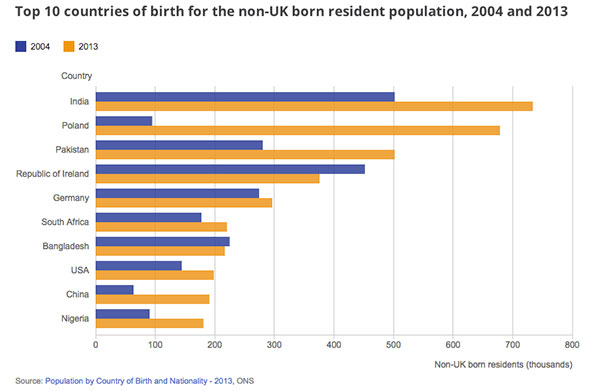WITH less than four months remaining until the 2015 general election, migration continues to be a topic of considerable interest amongst voters.
This is despite Prime Minister David Cameron’s controversial omission of the subject last week, in a speech outlining the first six themes for the Conservative’s manifesto.
Whilst jobs, taxes, education, housing, retirement and the deficit were included, the impact of migration on the population in Britain, economy and society was not addressed.
A new report by Conservative thinktank Bright Blue, published on Monday, did tackle the issue of migration, however, and revealed that most Tories are actually in favour of 'contributing' immigrants to Britain, including international students, skilled professional and skilled manual workers.
It also stated that the most important policy relating to immigration for Conservatives is restricting migrants’ access to benefits, something that UKIP prioritise below tightening the immigration cap on non-EU migrants and withdrawing from the EU principle of free movement of workers.
It warned, however, that restrictive policies towards migrants coming to Britain risked alienating ethnic minority Tories who "will be an important part of the Conservative Party's support base in the years ahead".
In light of this recent debate surrounding migration to Britain, the Office For National Statistics (ONS) have released an overview of key aspects of the nation over the last three decades.
It presents some key statistics on flows of long-term migrants into and out of Britain, and the impact of migration on the population.
According to the figures the number of migrants from Ireland fell by 76,000 between 2004 and 2013.
India-born migrants living in Britain have risen by 232,000 since 2004 to total 734,000 in 2013, whilst Polish-born residents increased by 584,000 over the same period.
The absence of immigration as part of Cameron’s election focus going forward could alienate an electorate that hold the matter as an issue vital to Britain’s future.
Quick to criticise the Prime Minister’s decision was UKIP, regarded arguably as one of the biggest threats to Cameron in the upcoming election with their anti-immigration policies.
UKIP migration spokesman Steven Woolfe MEP said: "Despite all his rhetoric last year, David Cameron's omission of immigration as a major topic during this year's election is yet another example of the prime minister running away from debating the big issues. The matter absolutely cannot be swept under the carpet."


